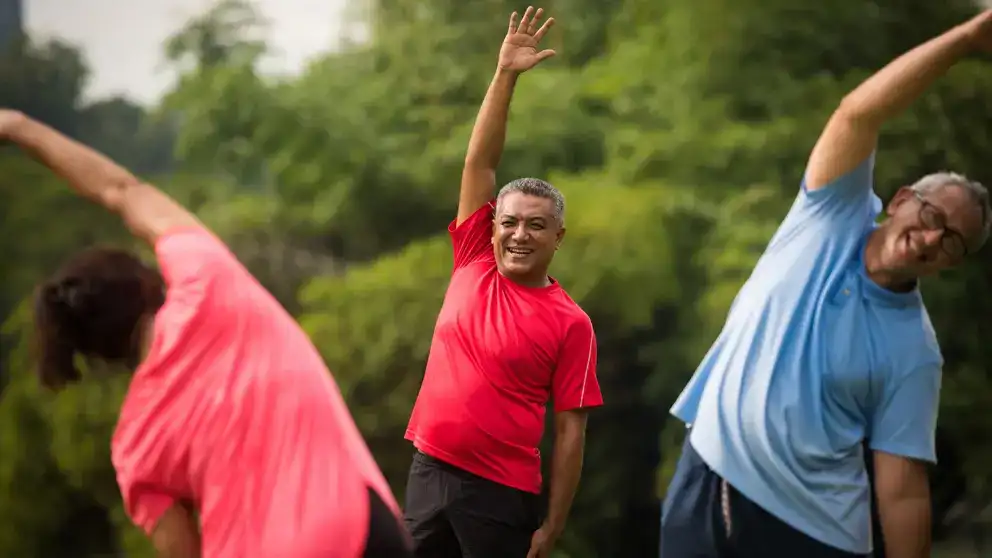“I’ll lose weight once I get back to my exercise.” “I just need to get in more activity.” “Sure, I’ll have a doughnut. I worked out today.”
We’ve all heard these lines, and perhaps even said them ourselves (I know I have). This notion that we should exercise to burn calories is all around. But it’s wrong, or at least not quite right. While exercise does burn calories, it burns so little that it’s really a myth exercise will lead to weight loss.
Let’s look at this more closely. Walking for half an hour will burn between 100 and 120 calories. There are 3,500 calories in one pound of fat. So it would take a month of walking for 30 minutes each day to burn off that pound of fat. This assumes all the calories burned come from fat (which isn’t true), and doesn't factor in what you eat or how much activity you get throughout the rest of the day.
When you consider a can of pop or juice has 150 calories, or a grande Starbuck’s mocha Frappuccino has 410 calories, that half-hour of walking doesn’t seem like much.
So, does this mean exercise is not worth it?
Not at all. Exercise does so much more than burn calories. In fact, including exercise in your weight loss program is a must. Why? Because it helps to preserve the body’s muscle mass and metabolic rate.
When we eat less to lose weight, some of that weight loss is from muscle, which is not good. We want to lose fat, not muscle. In addition, our body is very clever. It knows when we are eating less and slows down the metabolic rate (burning even fewer calories). Continuing to be active while you’re on a diet helps to maintain your muscle and your metabolic rate, ensuring that any weight loss comes from fat. In addition, exercise has a whole bunch of other benefits.
1. Enhanced sleep
Nearly half of adults have challenges getting a good night’s sleep. Most of us recognize that after a poor sleep, thinking is harder and we’re more easily frustrated and irritable. We may even eat more high-energy foods to help give us a boost. Over time, lack of sleep can affect our long-term health, such as an increased chance of obesity, diabetes and heart disease.
Regular exercise can help improve sleep quality by suppressing melatonin, the sleeping hormone. This will help you stay awake during the day and prepare your body for a nighttime release of melatonin, making it easier to fall and stay asleep. Exercise also reduces stress and anxiety, which may be reasons why you’re having trouble sleeping to begin with.
2. Reduced risk of chronic disease
With more than half of adults having a chronic disease such as diabetes, heart disease, cancer or arthritis, the odds of getting a disease in our lifetime is quite high. However, most chronic diseases can be prevented and being physically active can help. Meeting the current guidelines of 150 minutes of moderate to vigorous activity per week can reduce your chance of dying from heart disease and stroke by almost 30%.
The risk of getting cancer is also lower in people who are active. And it doesn’t matter how much you weigh or if you are losing weight, the health benefits of exercise still happen.
3. Increased energy
Exercise is our natural pick-me-up. While many of us might grab the nearest coffee for the caffeine boost, a short burst of activity can give you a bigger pick-me-up. In a group of young women who were chronically tired due to lack of sleep, 10 minutes of stair walking increased mood and energy more than a 50 mg caffeine pill (more than a cup of coffee).
4. Less stress
Stress is a big part of our daily lives, while some is beneficial, continual stress is a hazard to our health. If you’re stressed, exercise can help by removing you from the stressful situation and distracting your mind. The more engaging the activity, the more distracted you’ll be.
On a physiological level, exercise can lower the stress hormone cortisol. While cortisol increases immediately after exercise, levels decrease later on. And if you can be active around nature, even better, as nature has a calming effect, reducing cortisol as well as blood pressure.
5. Better brain function
Numerous studies indicate that people who are regularly active have improved memory and cognitive ability. Exercise even increases the size of your hippocampus, and a bigger brain is a good thing. Many of these benefits occur even after just one bout of activity and will continue to add up over time. After four weeks of exercise, your memory improves. Longer-term studies have demonstrated regular exercise lowers your risk of depression.
6. More happiness
Sometimes when you’re feeling stressed or in a bad mood the last thing you want to do is get up and exercise. It’s much easier to sit or lie down and wallow in your mood. But exercise is one of the few things that can brighten you up.
When we exercise our body releases hormones called endorphins. Some people refer to these as the happy hormones. Endorphins act as pain suppressants and have sedative properties like morphine, but endorphins are natural. Following exercise, endorphins are released and are believed to give us a euphoric feeling. It’s what some people call the runner’s high, and can even be felt after low levels of activity. This feeling of euphoria can also last throughout that day and into the next.
When you stop focusing on calories and start focusing on your overall mental and physical health, regular exercise can be an incredibly rewarding experience.
Ten minutes isn’t a lot of time, and the benefits make for a great return on investment. So, try and incorporate short bursts of activity into your daily routine and see how it impacts your mental and physical health. You’ll find a little movement goes a long way.

Dr. Scott Lear
Dr. Scott Lear is a leading researcher in the prevention and management of heart disease. He holds the Pfizer/Heart and Stroke Foundation Chair in Cardiovascular Prevention Research at St. Paul’s Hospital in Vancouver, and he is a professor in the faculty of health sciences and the department of biomedical physiology and kinesiology at Simon Fraser University. Dr. Lear also lives with heart disease himself. Follow his blog at drscottlear.com.

